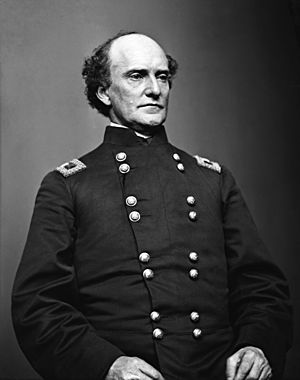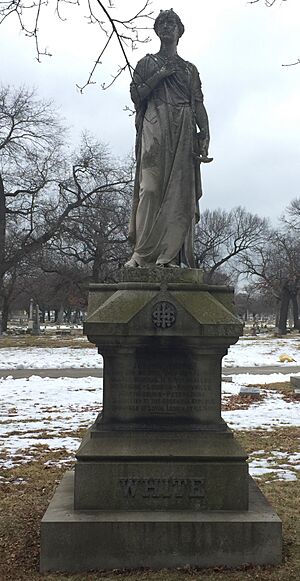Julius White facts for kids
Quick facts for kids
Julius White
|
|
|---|---|
 |
|
| United States Minister to Argentina | |
| In office June 5, 1868 – July 8, 1869 |
|
| President | Andrew Johnson Ulysses S. Grant |
| Preceded by | Robert C. Kirk |
| Succeeded by | Thomas O. Osborn |
| Member of the Wisconsin State Assembly from the Milwaukee 3rd district |
|
| In office January 1, 1849 – January 7, 1850 |
|
| Preceded by | William W. Brown |
| Succeeded by | Edward McGarry |
| Personal details | |
| Born | September 23, 1816 Cazenovia, New York, U.S. |
| Died | May 12, 1890 (aged 73) Evanston, Illinois, U.S. |
| Resting place | Rosehill Cemetery, Chicago, Illinois |
| Political party |
|
| Spouse | Catherine Frances Collins (died 1892) |
| Children |
|
| Signature | |
| Military service | |
| Allegiance | |
| Branch/service | Union Army |
| Years of service | 1861–1865 |
| Rank |
|
| Commands |
|
| Battles/wars | American Civil War |
Julius White (born September 23, 1816 – died May 12, 1890) was an important American businessman. He also served as a general in the Union Army during the American Civil War. After the war ended, he became the U.S. Minister (like an ambassador) to Argentina.
Contents
Early Life and Business Career
Julius White was born on September 23, 1816, in Cazenovia, New York. When he was twenty, he moved to Chicago, Illinois. There, he started several different businesses.
Later, he moved to Milwaukee, Wisconsin, to work in commercial business. He became an insurance agent. In 1848, he was elected to the 2nd Wisconsin Legislature. He served one year as a member of the Wisconsin State Assembly for the Whig Party.
Soon after, White returned to the Chicago area. He became a well-known insurance agent and underwriter. He was even the president of the Chicago Board of Underwriters. He was also a member of the Chicago Board of Trade.
A Visit from Abraham Lincoln
During the Presidential election of 1860, White invited Abraham Lincoln to his new home. Lincoln was a former fellow Whig and an "old friend" of White. Lincoln visited White in Evanston in April. He enjoyed his time there and stayed overnight.
On March 30, 1861, President Lincoln appointed White as the customs collector for the Port of Chicago. This job involved collecting taxes on goods coming into the port.
Serving in the Civil War
White left his customs job to join the army. On September 19, 1861, he became a colonel of the 37th Illinois Volunteer Infantry Regiment. He led his regiment in the southwest Missouri campaign in late 1861. This was under the command of John C. Frémont.
Key Battles and Promotions
At the Battle of Pea Ridge on March 7, 1862, White's brigade played a key role. His two Illinois regiments stopped an attack by Confederate soldiers. The next day, his troops helped in the final attack that defeated the Southern army.
White was promoted to brigadier general on June 9, 1862. He then led the "Railroad" Brigade. This unit was part of the VIII Corps.
The Harpers Ferry Surrender
During the Second Battle of Bull Run, White's unit was in Martinsburg, West Virginia. When Robert E. Lee's army invaded Maryland, White's troops moved to Harpers Ferry, West Virginia. They joined Colonel Dixon S. Miles and his large group of soldiers there.
Even though White was a higher rank, he followed military rules. He put himself under Miles's command because Miles was in charge of the area. This turned out to be a difficult decision. Miles was not able to defend the position well.
The Battle of Harpers Ferry took place from September 12–15, 1862. The Union forces were in a very bad position. Miles also made many mistakes. When Miles decided to surrender, he was badly wounded by one of the last shots. So, White had to officially surrender the location.
White was later investigated for the surrender. However, he was found innocent. The court decided that he had acted bravely and skillfully.
Later War Service
White was then assigned to the XXIII Corps. He commanded the 2nd Division during the Knoxville Campaign in 1863. In July 1864, he was sent to the Eastern Theater. There, he commanded a division in the IX Corps.
He briefly served as Ambrose Burnside's chief of staff during the Battle of the Crater. He also commanded the 1st Division in the IX Corps at the Battle of Globe Tavern. This division was later disbanded. White resigned from the army on November 19, 1864. He was given the honorary rank of major general for his service in the war.
Life After the War
After the Civil War, Julius White returned to the insurance business. In 1871, Cook County changed its government. White was elected to the new Cook County Board of Commissioners. He was also chosen as its first chairman. This was notable because most of the commissioners were from Chicago, and White was not.
In 1872, White left the insurance business. He started working in real estate. He was also one of the people who helped start the First Congregational Church of Evanston in 1869.
White served as the U.S. Minister to Argentina. This was from November 1873 to March 1874.
Julius White passed away on May 12, 1890, in Evanston. He is buried at Rosehill Cemetery in Chicago.
A street in Chicago's Loop was once named White Street after him. It is now called Locust Street.
See also
- List of American Civil War generals (Union)


